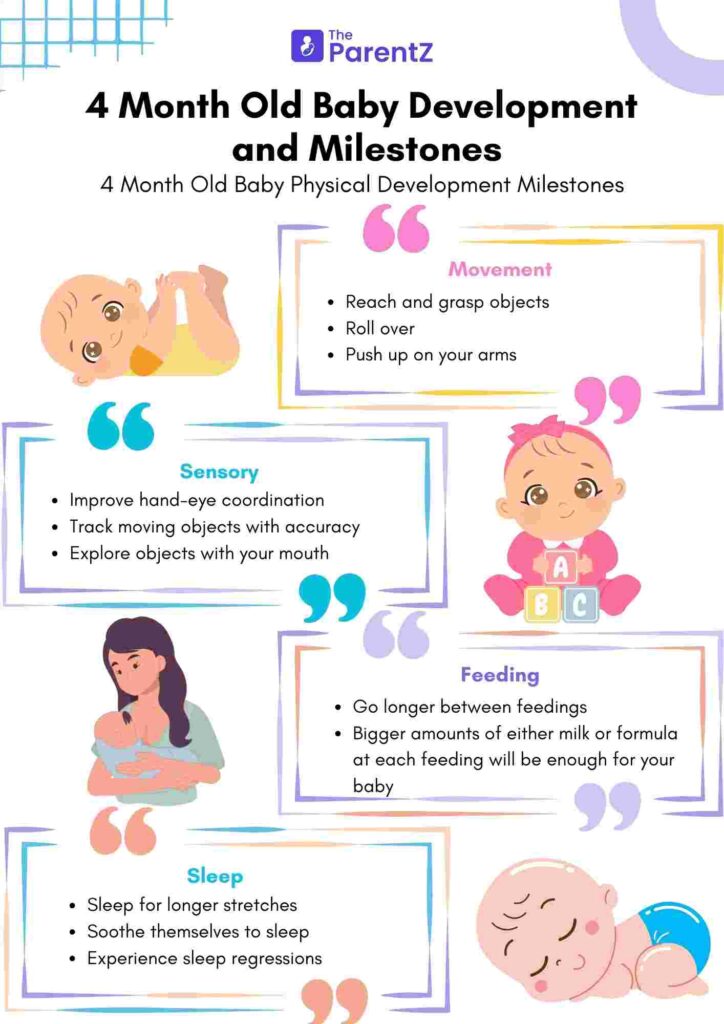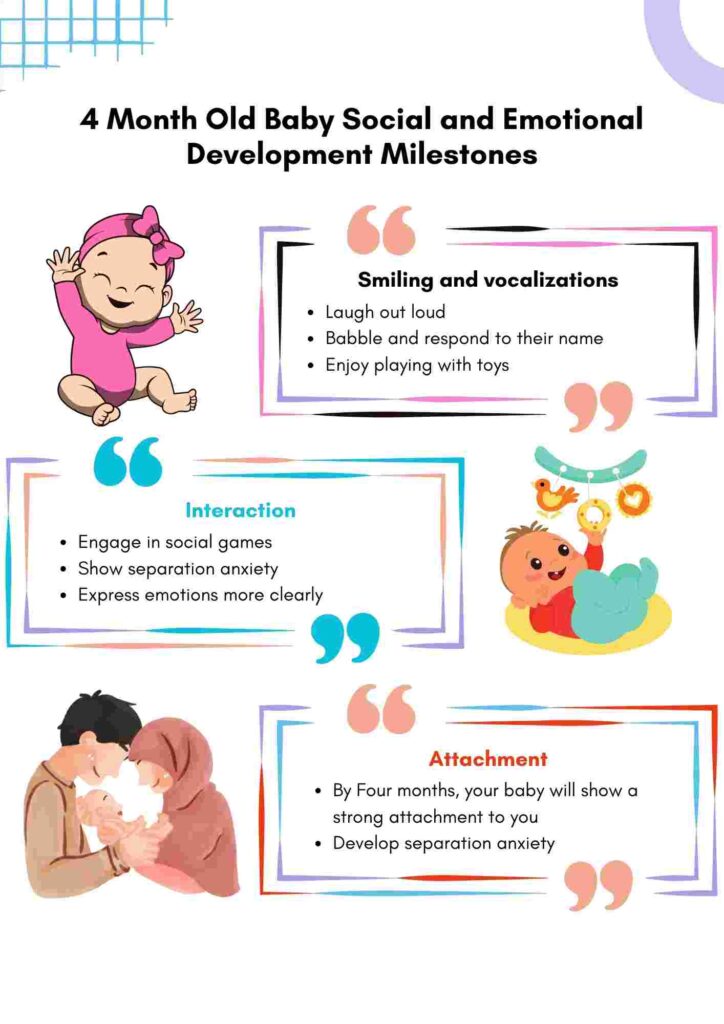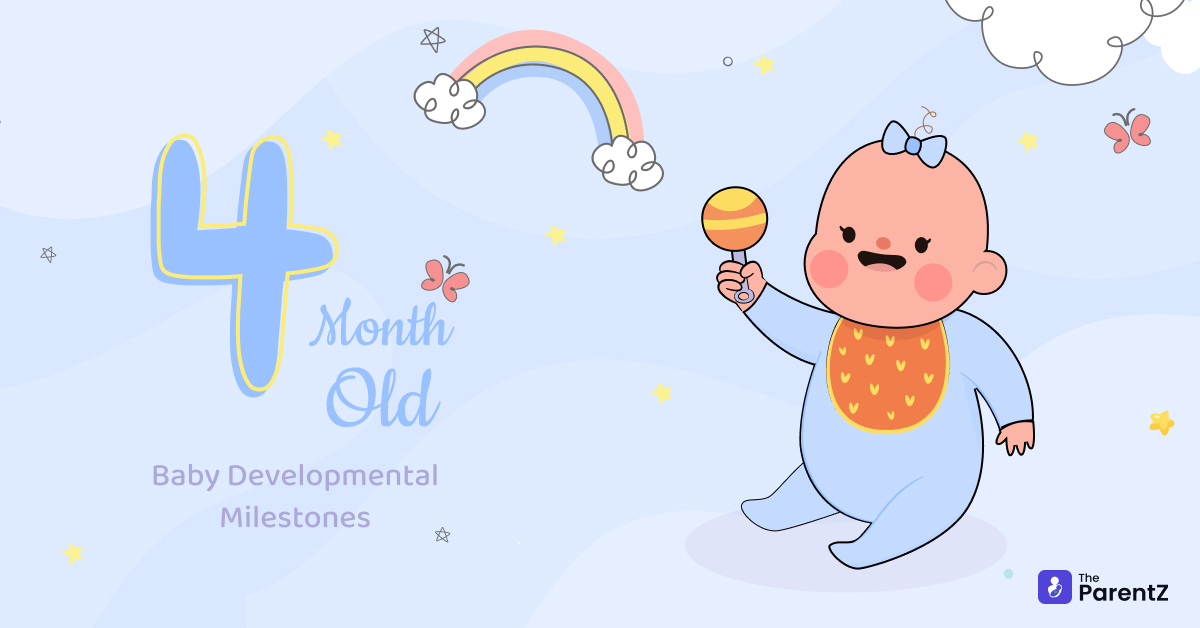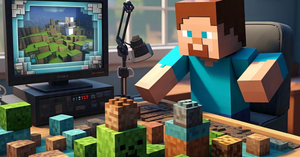Your baby has come a long way from the day they were born. At three months, they began smiling, cooing, and lifting their heads. At 4 months old, they begin to venture forth into the world with new curiosities and a little more confidence. They are also becoming more social and communicative, revealing their personalities and feelings.
Here are some of the exciting growth and developmental milestones that your 4-month-old baby may achieve in the following areas:
4 Month Old Baby Physical Development Milestones
Movement
Your baby’s physical abilities are improving rapidly. They may be able to do some of these things:
- Reach and grasp objects. The motor skills of your baby are improving fast. They may be able to do some of these things. Reach and grasp objects. He or she can use the hands to grab toys, blankets, or your fingers. They can also put other objects into their mouths to feel them with their tongue and gums.
- Roll over. Your baby can roll from the back to the tummy or vice versa. This is an excellent method of exercising their muscles and coordination. Always supervise your baby on their tummy, and never leave them alone on a high surface.
- Push up on your arms. Your baby can raise their chest and head from the floor by propelling themselves with their arms. This makes them develop their neck and back muscles, preparing them for crawling in the future.
Sensory
Your baby’s senses are also becoming more refined. They may be able to do some of these things:
- Improve hand-eye coordination. . Your baby can track objects as they move and grab for them. They may also attempt to scratch or hit dangling toys or mobiles.
- Track moving objects with accuracy. Your baby can observe moving objects within their visual range, for example, a ball, car, or person. They might as well rotate their heads to pick up sounds or voices.
- Explore objects with your mouth. Additionally, your baby can use their mouth to explore the shape, feel, and taste of different items. They may also drool in readiness for teething.
4 Month Old Baby Social and Emotional Development Milestones
Laughter and Vocalizations
Your baby’s social and emotional skills are also developing quickly. They may be able to do some of these things:
- Laugh out loud. laughter, giggling, or chuckling are ways in which your baby expresses their joy and amusement. They can chuckle at some faces, voices, or touches. They could as well laugh at themselves, for instance, when they drop something or when they make a noise.
- Babble and respond to their name. . The baby may also produce sounds, e.g., “ba,” “da,” “ga,” or “ma,” as well as attempt to imitate speech or respond to your voice. They would respond by looking at you, smiling, or babbling back.
- Enjoy playing with toys. There are pairs of toys that your baby can play with. A rattle, a soft book, or a block are examples of such pairs of toys. They even tend to have favorites for some toys, colors, or figures. Sometimes, they might also attempt to give you their toys or present them to you.
Interaction
Your baby’s interaction with others is also becoming more complex. They may be able to do some of these things:
- Engage in social games. Simple games that your baby can join include peek-a-boo, pat-a-cake, or hide-and-seek. They can also start or react to these games by covering their faces, clapping their hands, or getting you.
- Show separation anxiety. Your child may also become clingy and display separation anxiety when you step out. They are likely to cry, cling, or protest when you leave or when a stranger comes close to them. This is all right and good, for this means your baby trusts you and loves you.
- Express emotions more clearly. Your baby is capable of displaying different emotions, such as happiness, sorrow, anger, or fear. They can also express their feelings through their facial expressions, body language, or vocalizations. They may also seek to soothe themselves or others by embracing, caressing, or kissing.
Feeding
Your baby’s feeding habits may also change. They may be able to do some of these things:
- Go longer between feedings. . Bigger amounts of either milk or formula at each feeding will be enough for your baby, and he or she will stay satisfied longer. They can also sleep at night for a longer time, thus giving you some break.
Sleep
Your baby’s sleep patterns may also become more consistent. They may be able to do some of these things:
- Sleep for longer stretches. At night, your baby can sleep from 6 to 8 hours, and during the day, take 2 to 3 naps. They also have regular bed and wake-up times, which helps them build up a good habit of sleep.
- Soothe themselves to sleep. Your baby can self-settle. Thumb sucking, blankie cuddling, or singing a song may also enable them to help themselves sleep when they wake up in the night.
- Experience sleep regressions. Your baby might have intermittent sleep disruptions when he or she gets up much more often, cries more, or has difficulty falling asleep.This may be due to development leaps, teething, illness, or changes in their environment. You can help your baby cope by being patient, consistent, and supportive.
Tips and advice for your 4 Month Old Baby Learn and Grow
- Respond positively to your baby.
- Provide opportunities for your baby to reach for toys, kick at toys and explore what is around them.
- Talk, read, and sing to your baby.
- Limit screen time to video calling with loved ones.
- Feed only breast milk or formula to your baby. Babies are not ready for other foods, water or other drinks before 6 months of age.
- Give your baby safe toys to play with that are easy to hold
- Set steady routines for sleeping and feeding.
- Lay your baby on her back
- Sing and talk to your baby and gently bend and move baby’s arms and legs up and down.
Conclusion
Your baby of 4 months is changing and learning every day. They are getting more sportive, inquisitive, and sociable. They are also creating their own attitudes and likes.
Bear in mind, however, that each baby is different and can achieve these milestones at different times. Let’s not worry about the speed of the baby, whether it is faster or slower than others, as long as it is happy and healthy. If you have any worries about your baby’s development, feel free to discuss them with your pediatrician or a child development specialist.


Explore what lies ahead for your 5-month-old with our insights on 5 Month Old Development Milestones.
Have a good time with your baby, and admire their successes. They are simply wonderful, and so are you!








Be the first one to comment on this story.